1. 이름을 잘 기억 못해요.
It usually takes me a while to start to write the introduction.
I am not very good at understanding what other people’s saying.
I often got the students’ names mixed up.
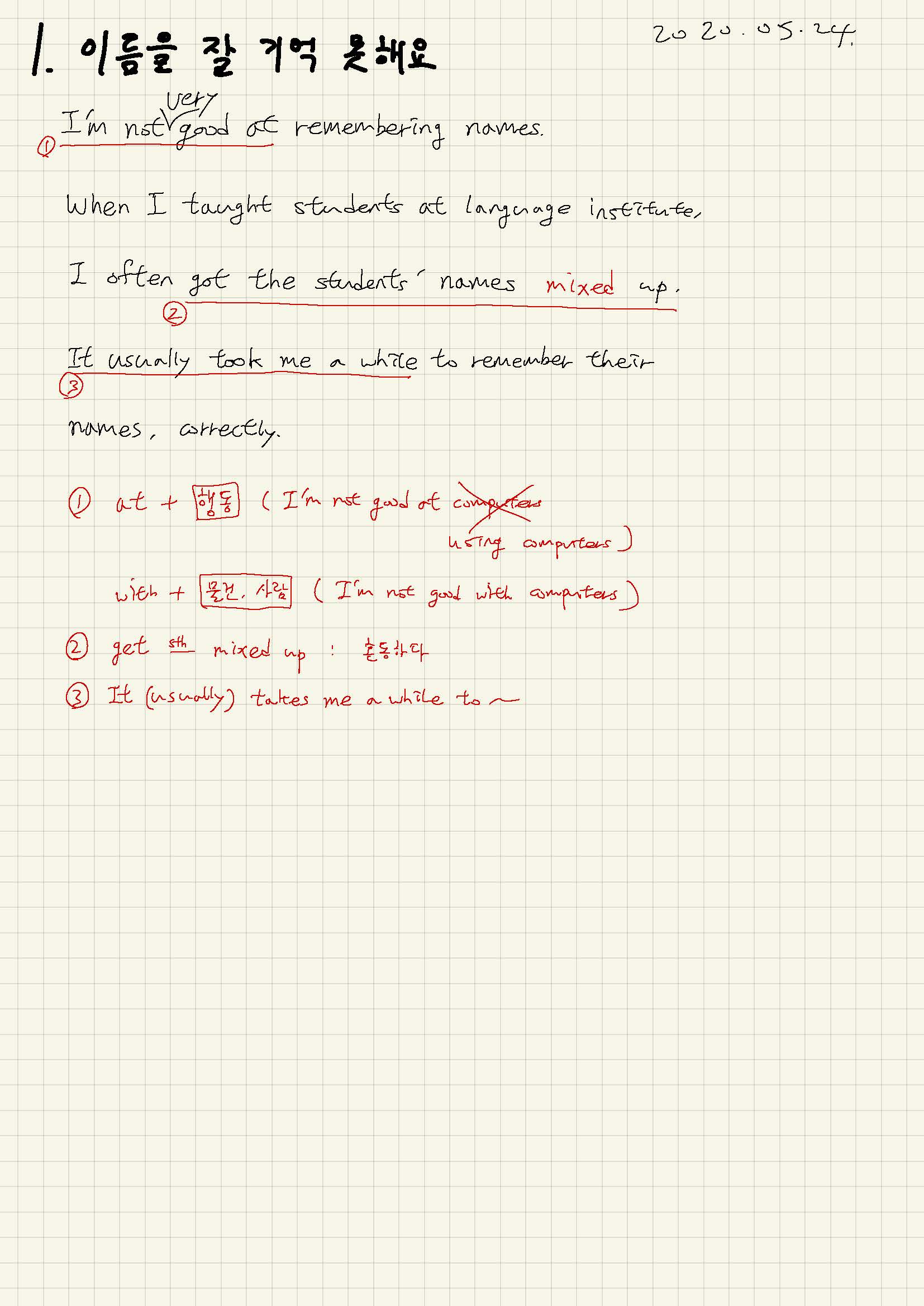 |
|---|
2. 지금은 생각이 많이 달라졌어요.
It really got me thinking about the perfume from a different perspective.
I feel differently about using perfume now.
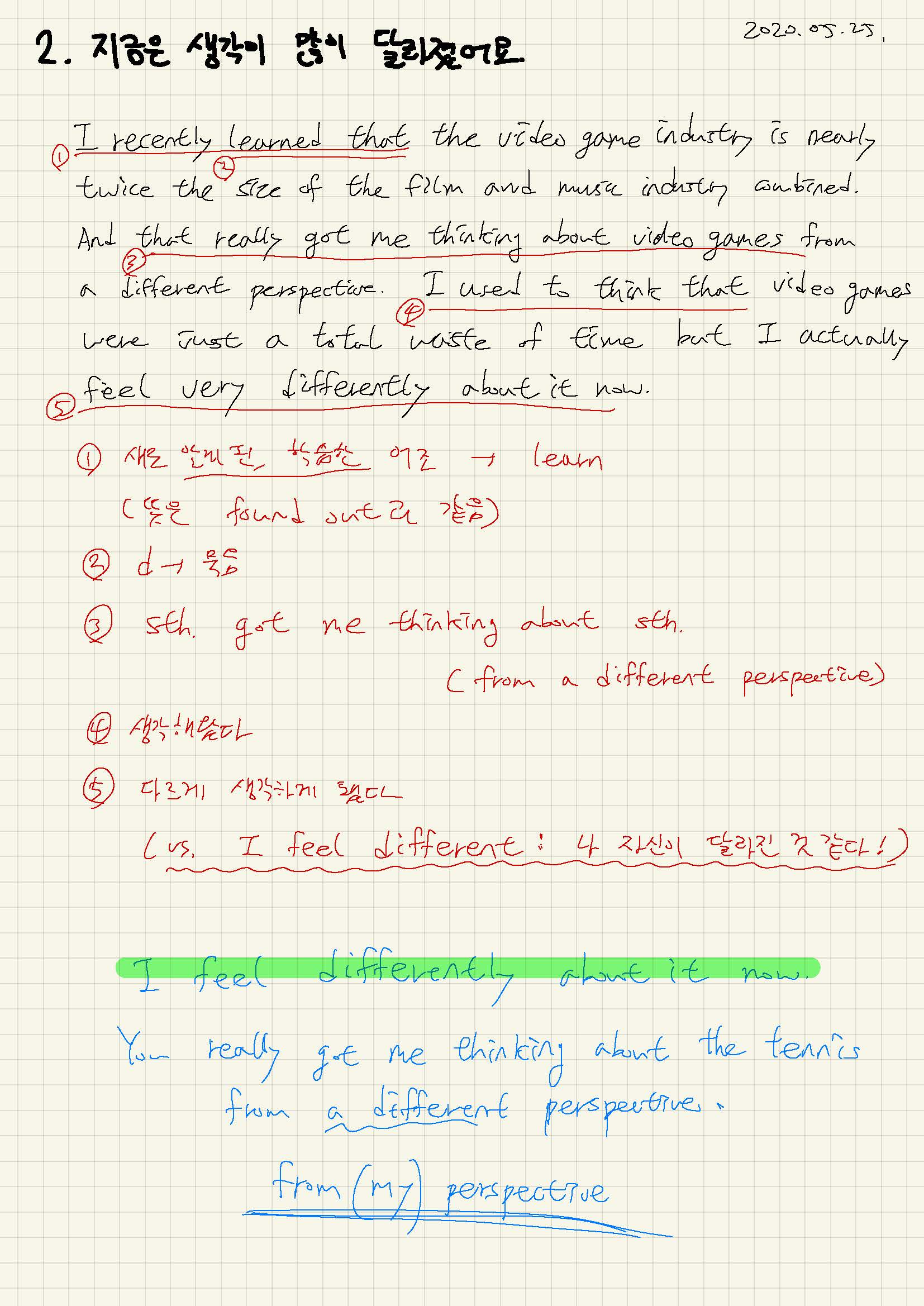 |
|---|
3. by vs. with
by: + 수단, 방법, 방식 (by subway)
with: + 도구 (with a hammer)
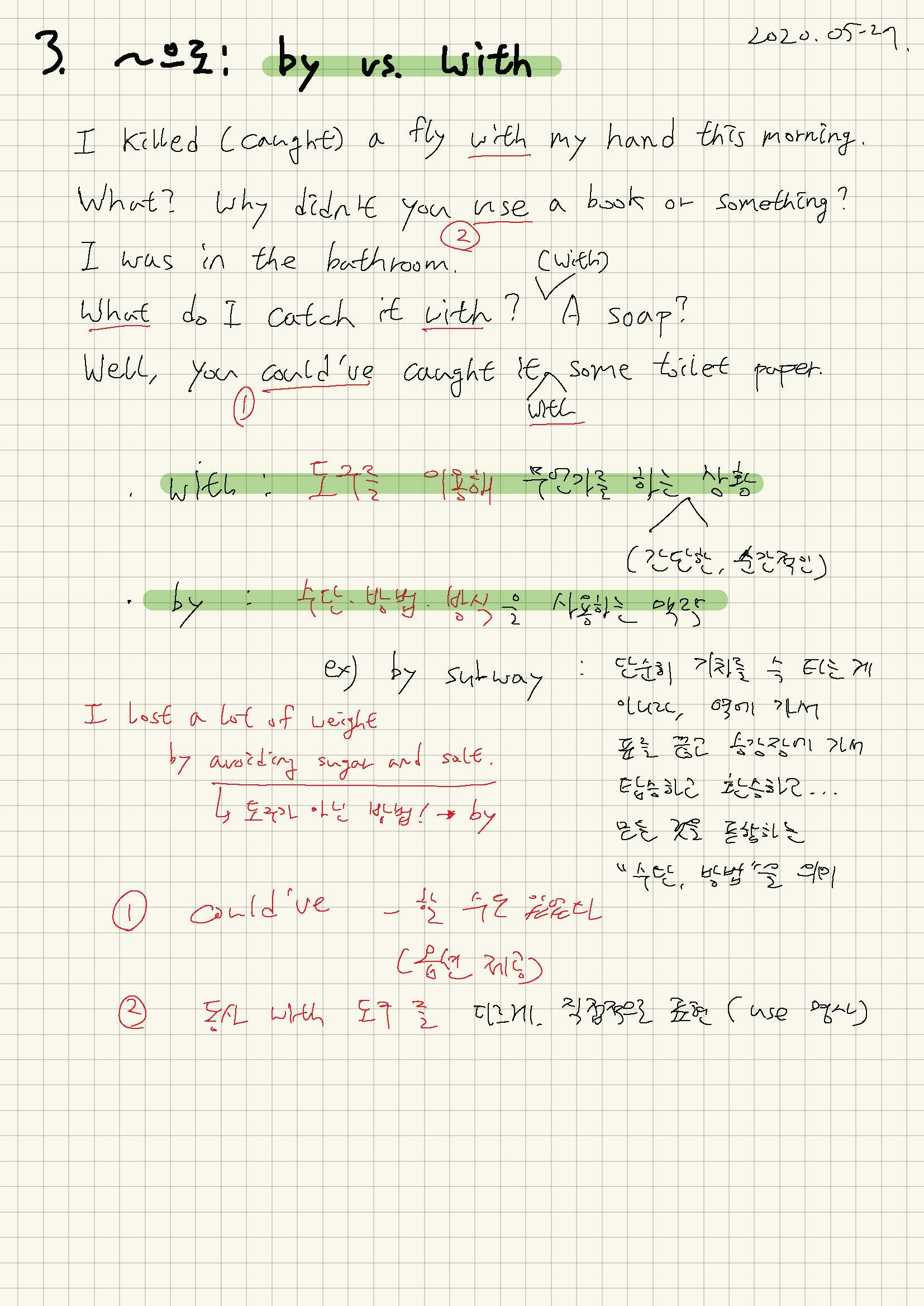 |
|---|
4. I hope vs. I’m hoping vs. Hopefully (미묘한 차이)
I hope: 지금 바라기 시작!
I’m hoping: 과거에 바라기 시작해서 지금도 바라고 있다!
Hopefully: 화자들이 공통으로 바라는 것!
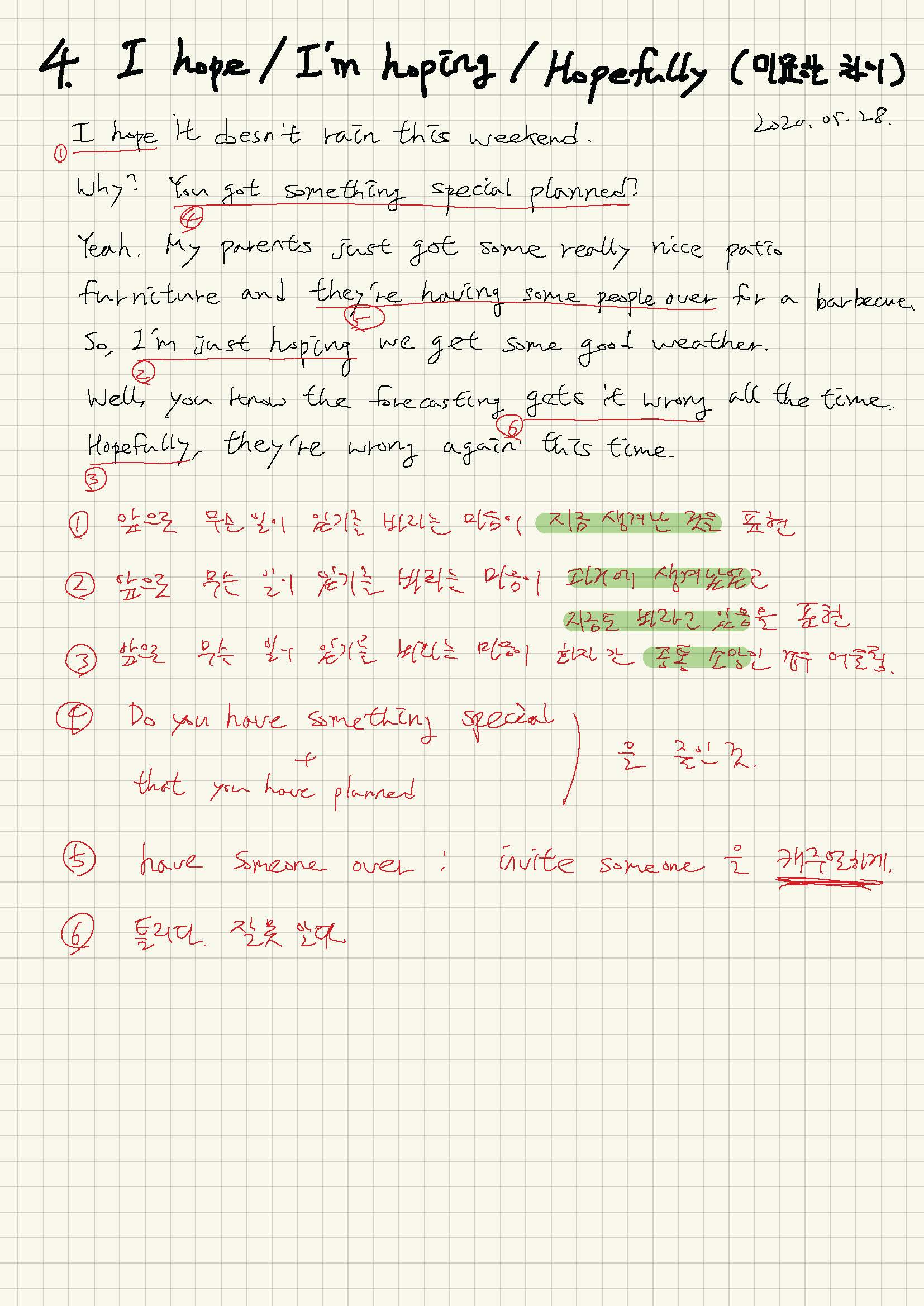 |
|---|
5. 이거 원래 이래?
It’s supposed to be like this. (이게 정상이다)
It’s always like this. (항상 이렇다)
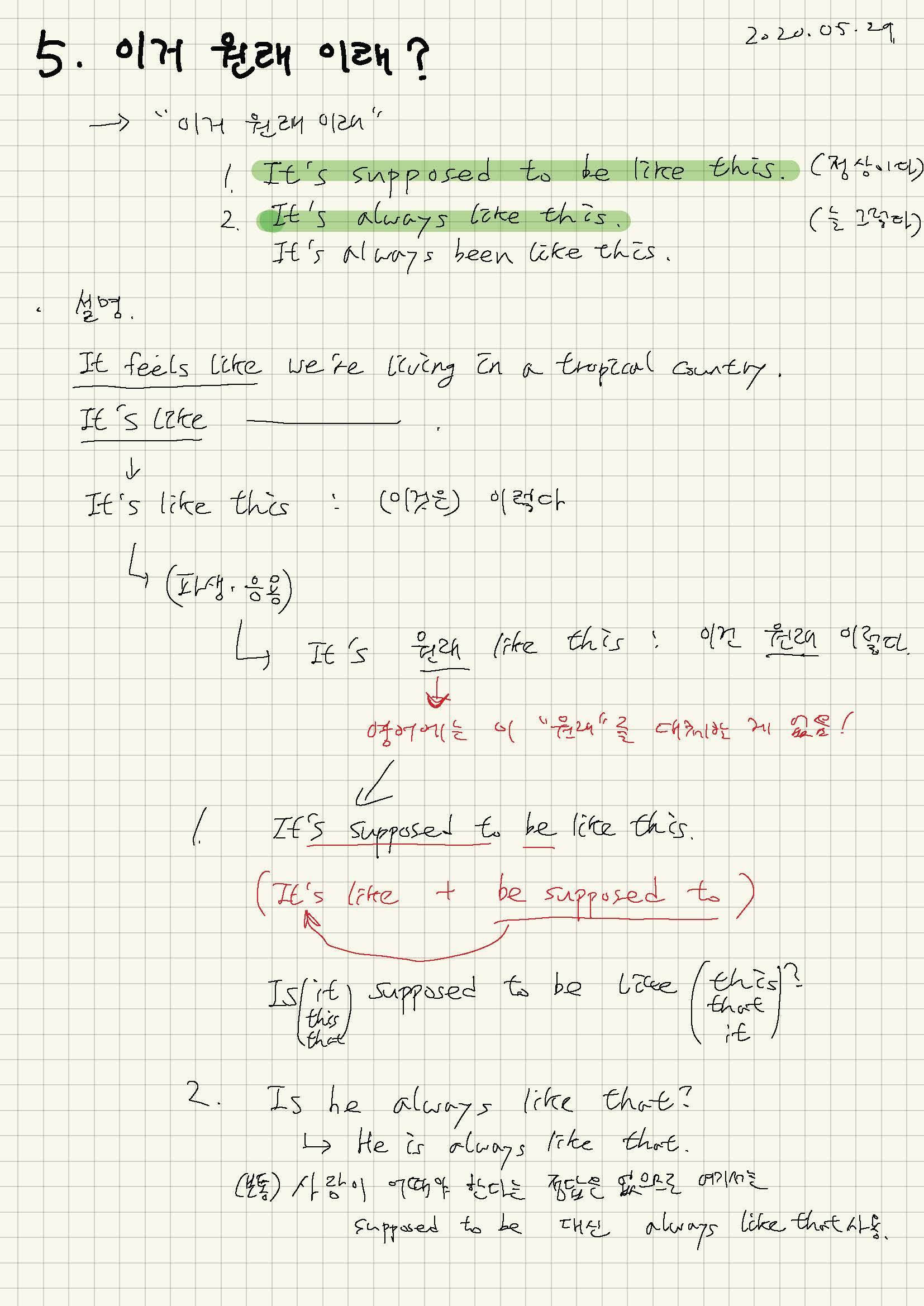 |
|---|
6. in/on/at - part 1
at: 시설물, 이벤트 (I met many professors at a conference)
in: 공간, 개인 이동 수단 (I was in a cafe yesterday afternoon)
on: I was in a cafe yesterday afternoon)
on: 표면, 이동 수단 (A mosquito is on the ceiling)
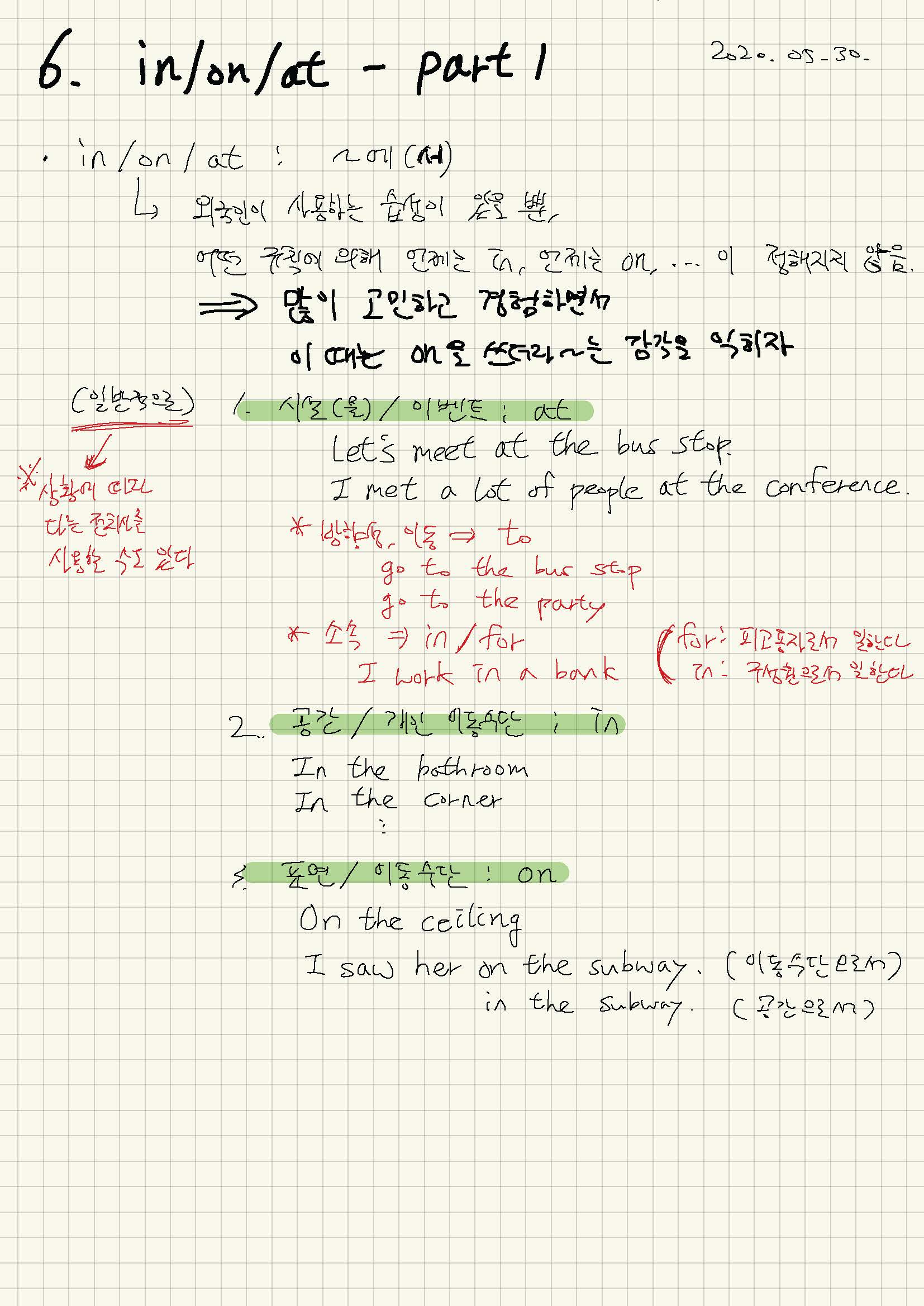 |
|---|
7. in/on/at - part 2
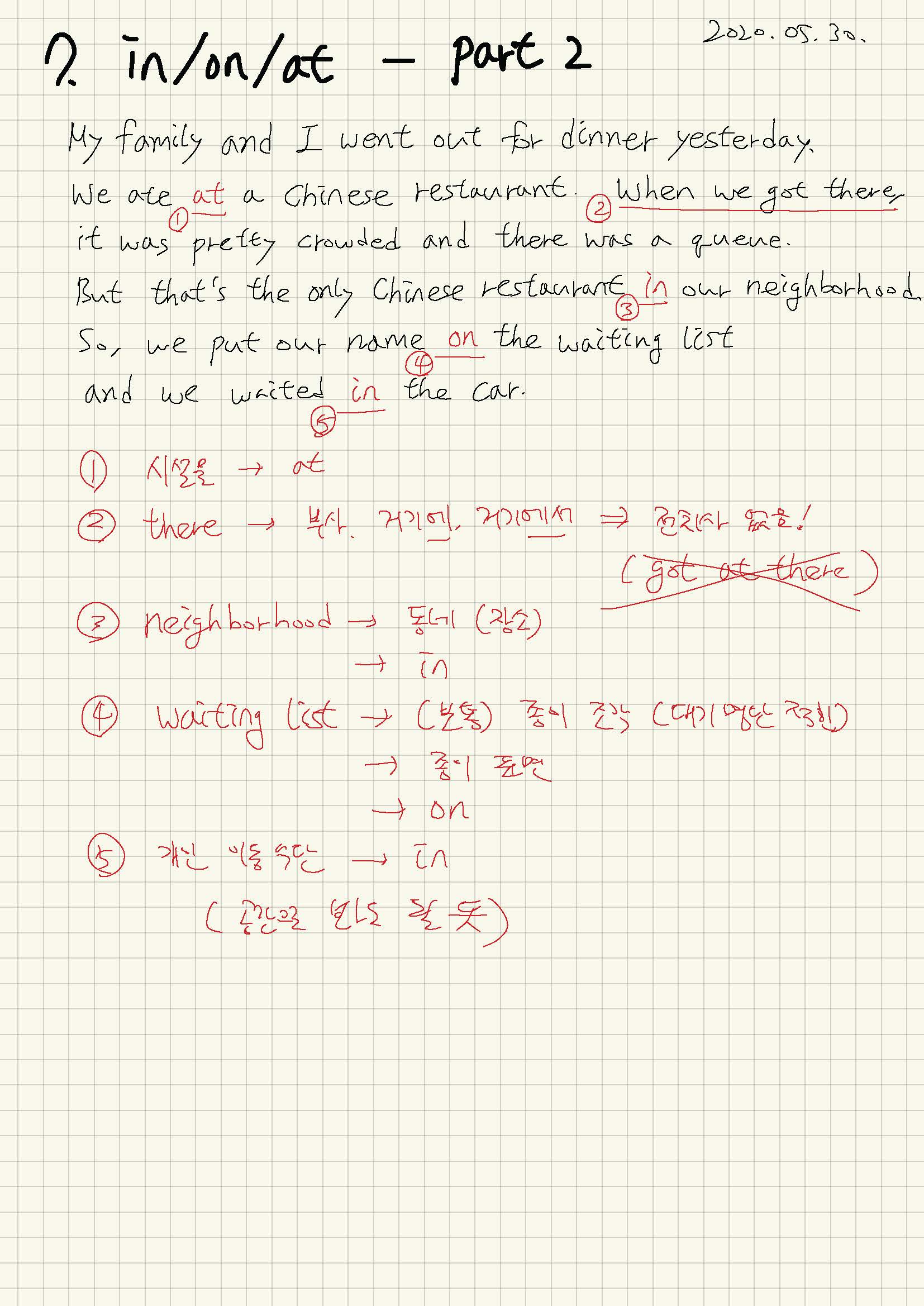 |
|---|
8. in/on/at - part 3
 |
|---|
I think I can take you to the airport: 연음! [테이큐루디에어폴ㅌ]
Thank would be: 연음! [대루비]
I can pick you up at your place: 내가 사는 곳이 아파트, 단독 주택… 상관 없이 place로 퉁칠 수 있다.
9. in/on/at - part 4
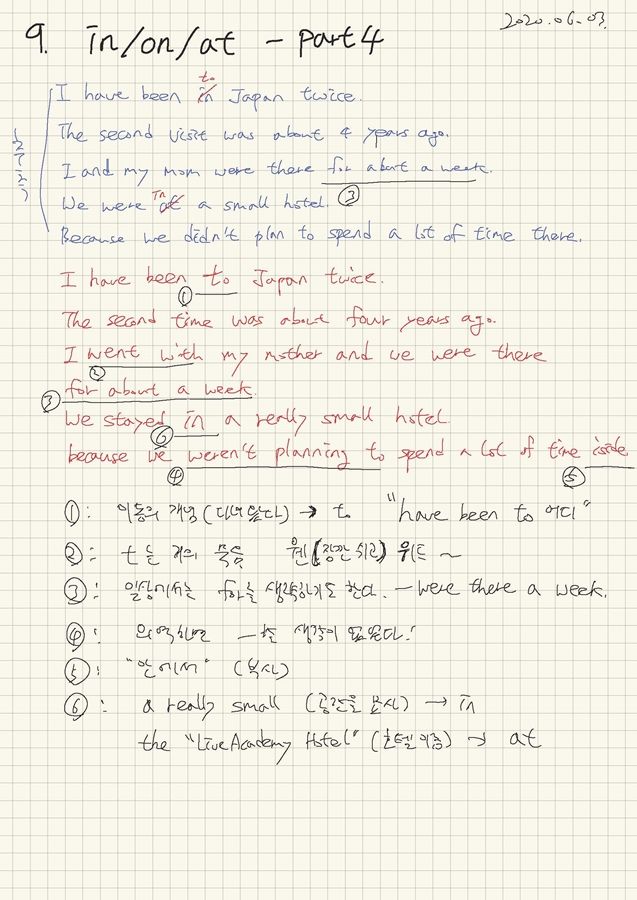 |
|---|
have been to 어디: 어디 가본 적 있다
I went with: t 묵음이지만 음절은 남겨둔다. [웬_ 위드]
We weren’t planning to ~: 그럴 생각이 없었다.
We stayed in a really small hotel: 공간을 묘사했으므로(really small) in을 사용한다. 특정 호텔을 지칭할 때는 at을 사용한다(at the LiveAcademy Hotel).
10. 시간을 나타내는 전치사
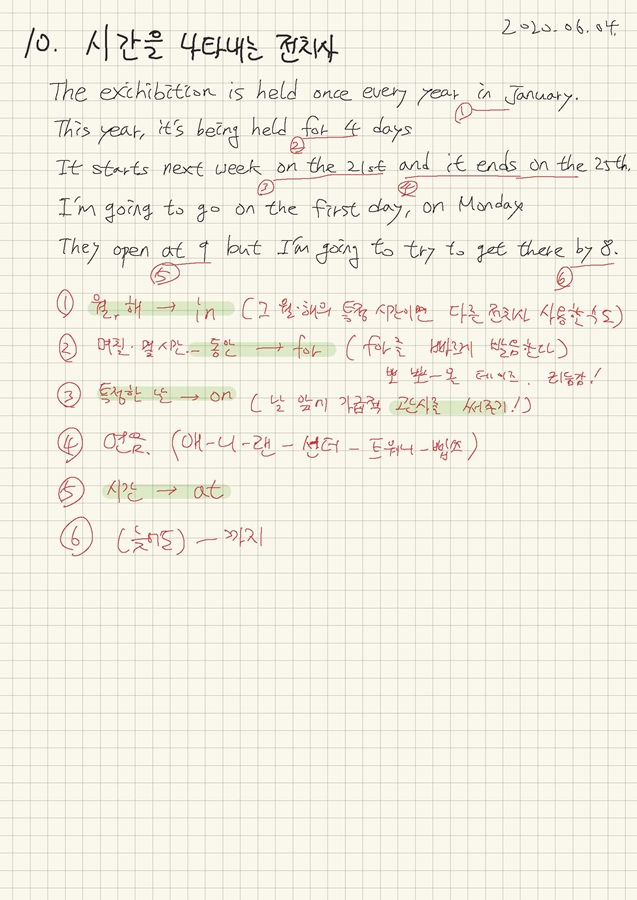 |
|---|
월, 해 –> in (* 그 월, 해의 특정 시간이면 다른 전치사를 사용하기도 함)
며칠, 몇시간… 동안 –> for (*for 4 days에서 for는 짧게, 리듬감 있게 발음한다. [뽀 뽀:올 데이즈])
특정한 날 –> on (가급적 관사를 함께 사용)
and it ends on the: 연음[애-니-랜-선더-트워니-삡스]
시간 –> at
(늦어도 )~까지 –> by
11. 그런 건 못 들어본 것 같은데?
 |
|---|
what does: 연음. [와러즈]
I don’t think I’ve heard of that: 그런 건 못 들어본 것 같은데? 연음. [헐 오_ 댓] f는 음절만 남긴다.
some kind of ~: 무슨 ~ 같은? Is that some kind of drink? 마시는 거야?
Is that a real thing?: 정말 그런 게 있어?
12. 딱히, 의외로, 아무렇지도 않게, 어쩔 수 없이, 점차
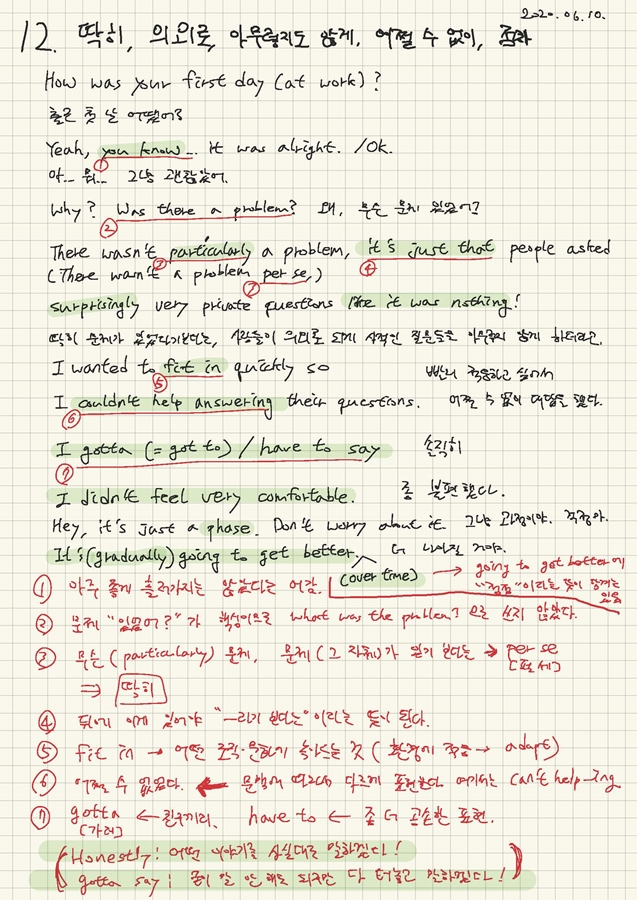 |
|---|
-
“어떠한” 문제가 있기 보다는 = 딱히 = particularly (There wasn’t particularly a problem.)
-
“문제(그 자체)“가 있기 보다는 = per se (There wasn’t a problem per se.)
-
I couldn’t help answering their questions. 어쩔 수 없이 대답했다.
13. finish up / end / done
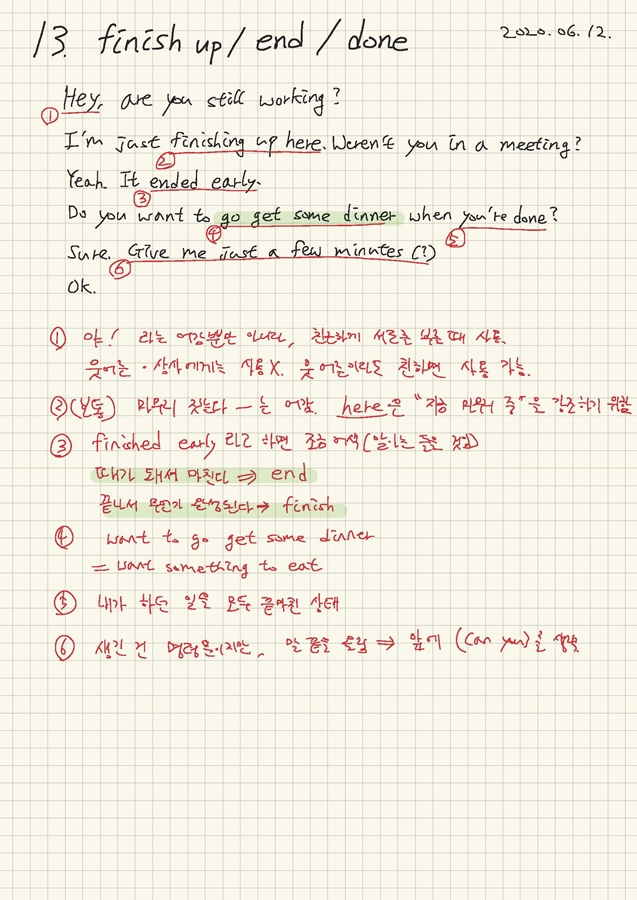 |
|---|
-
Hey! : 야! 친근하게 부를 때 사용. 보통 웃어른, 상사에게는 사용하지 않지만 친하다면 쓰기도 한다.
-
finishing up: 마무리 짓는다. 무언가 완성된다.
-
end: 때가 돼서 마친다.
-
done: 내가 하던 일을 모두 끝마친 상태.
-
Do you want to go get some dinner? (= Do you want something to eat?)
14. 궁금하다. 궁금한 게 있다.
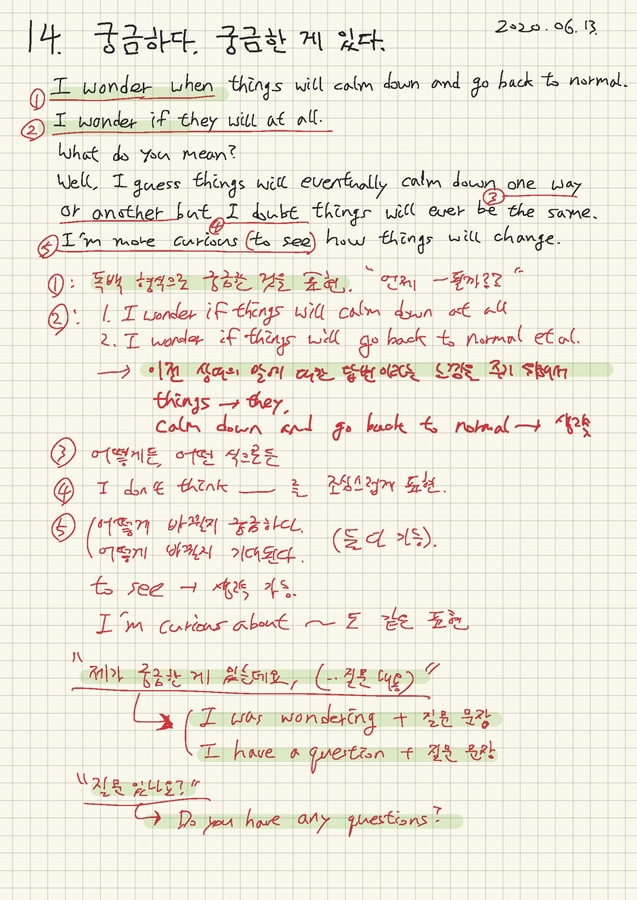 |
|---|
- I wonder when … (독백 형식으로 궁금한 것을 표현. 언제 ~~가 될까?)
- It will eventually come down one way or another. 어떻게든. 어떤 식으로든.
- I doubt ~: I don’t think~를 조심스럽게 표현.
- I am more curious (about): 궁금하다
- I was wondering + 질문 문장
- I have a question + 질문 문장
- Do you have any questions? 질문 있나요?
15. discuss + options / examine + opportunities
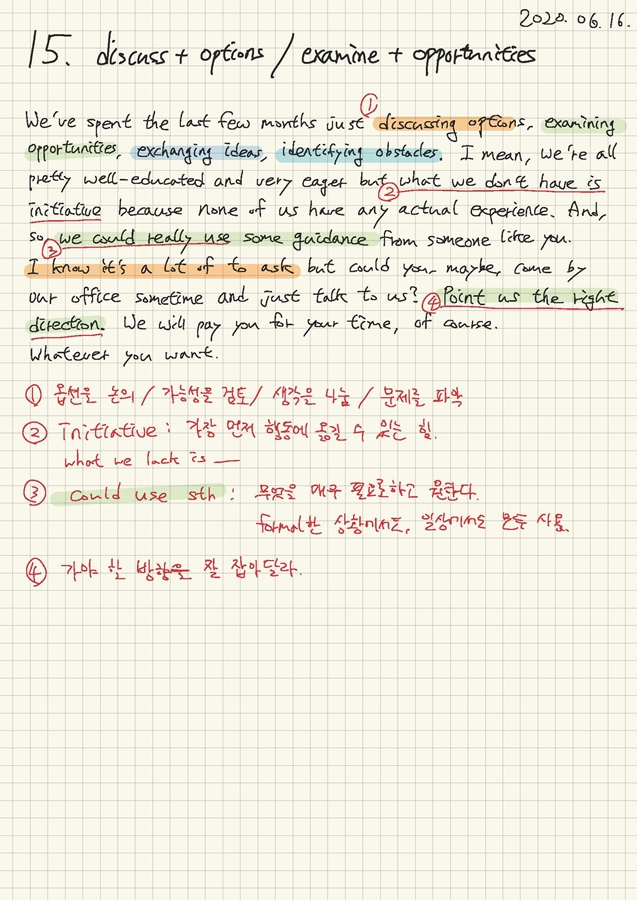 |
|---|
- discussing options
- examining opportunities
- exchanging ideas
- identifying obstacles
- I know it’s a lot of to ask but could you, may be, come by our office sometime?
- Please point us the right direction.
- We could really use sth. 무언가를 매우 필요로 한다. 원한다. 격식/비격식 상황 모두 사용 가능.
16. -할 게 있어서 -해달라고 부탁했다.
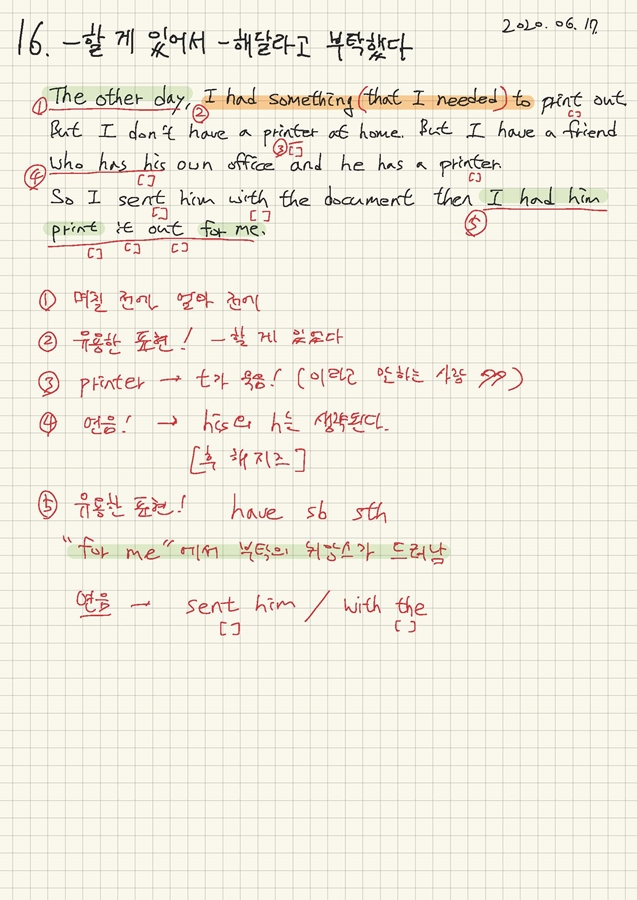 |
|---|
- I had him print it out for me.
17. 마음이 급하다, 서두르다, 나중에 후회할 말과 행동을 하다.
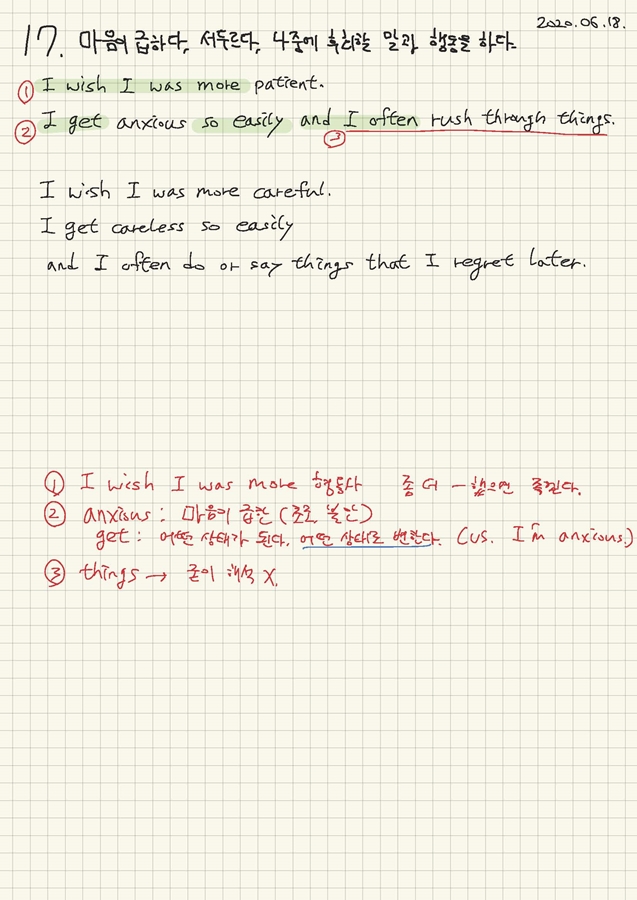 |
|---|
- I wish I was more careful.
- I get careless so easily.
- I often do things that I regret later.
18. 비례식 묘사/표현 1: ~할 수록 ~하다.
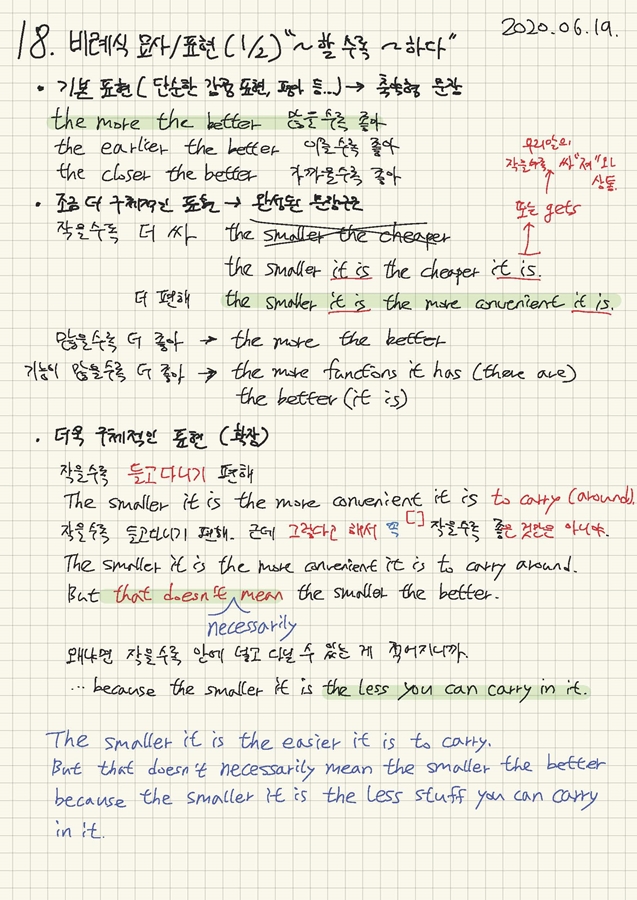 |
|---|
- The more the better.
- The smaller it is the more convenient it is to carry around. But that doen not necessarily mean the smaller the better because the smaller it is the less you can carry in it.
19. 비례식 묘사/표현 2: 하면 할수록
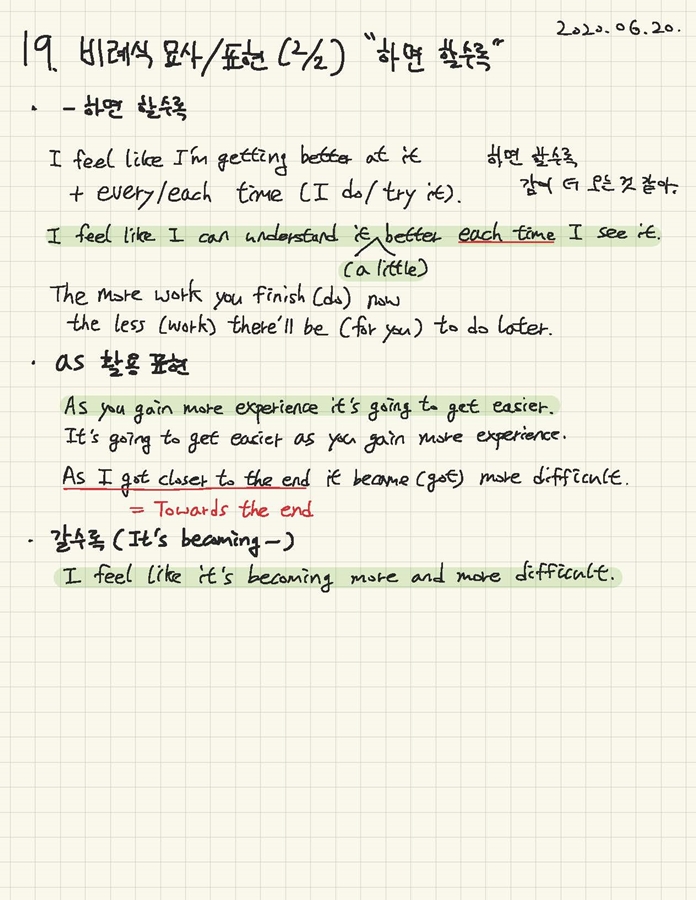 |
|---|
- I feel like I can understand it a little better each time I see it.
- As you gain more experience it’s going to get easier.
- I feel like it’s becoming more and more difficult.
20. ~하기 귀찮다.
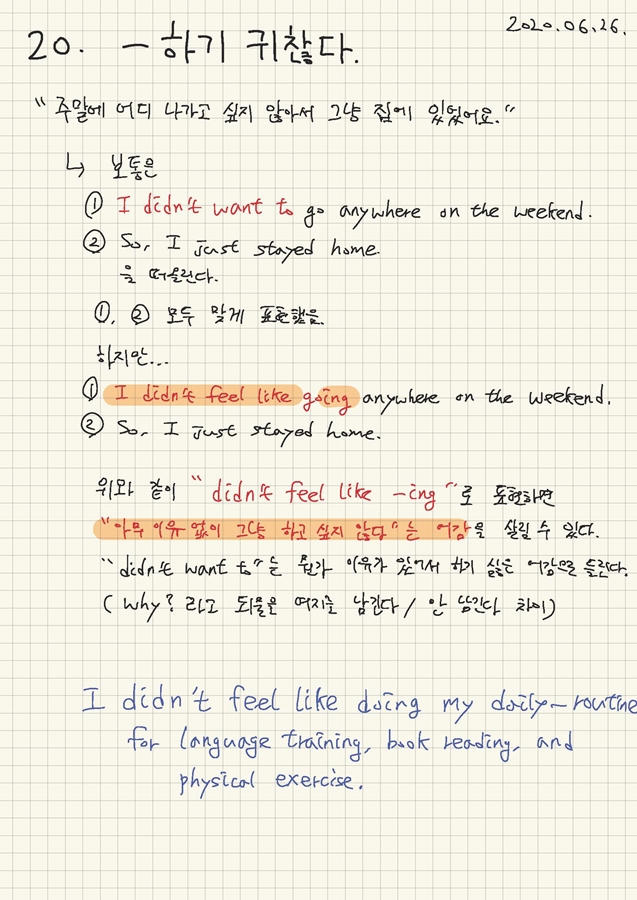 |
|---|
- I didn’t feel like going anywhere.
21. 겨우 ~했다, ~할 줄은 정말 몰랐다.
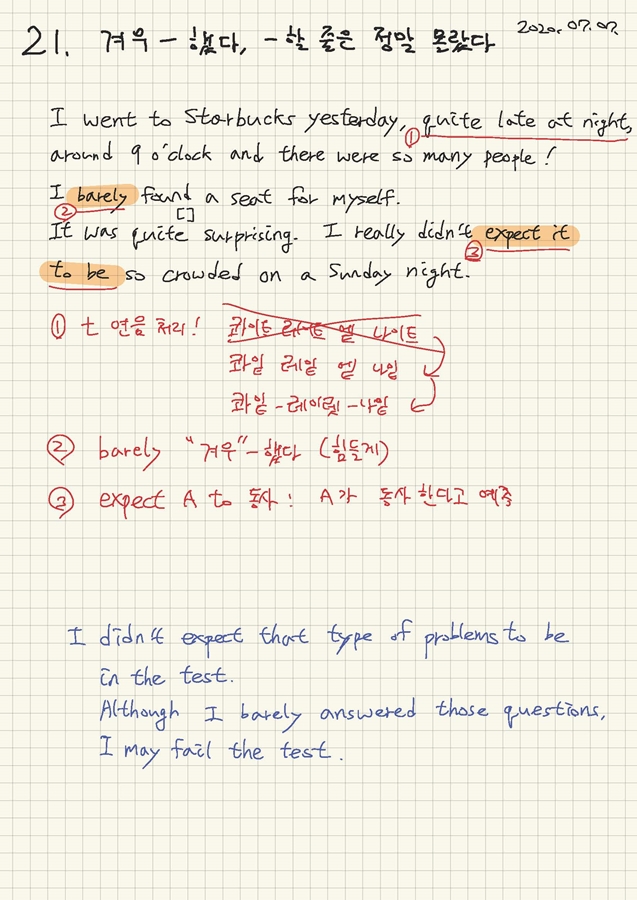 |
|---|
- I didn’t expect them to be in the test.
- I barely answered those questions.
22. 일의 진행 상태에 대해서 말하기
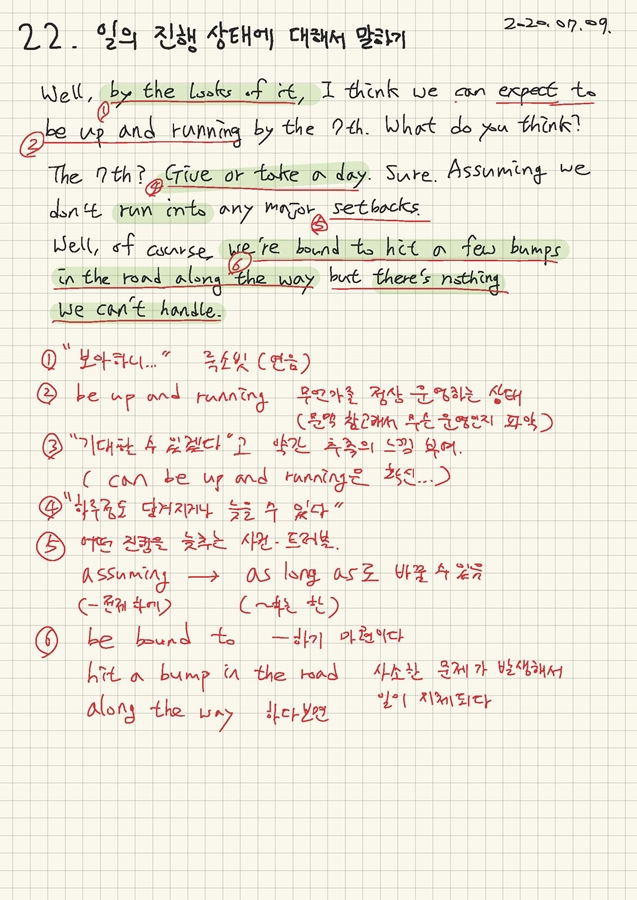 |
|---|
- by the looks of it (보아하니…)
- expect to be up and running
- give or take a day (예정일이 하루이틀 달라질 수 있다)
- run into setbacks (난관에 부딪히다)
- we are bound to hit a few bumps in the road along the way (하다보면 문제가 발생해서 지체되기 마련이다.)
23. 어쩌면, 아마도, 잘하면
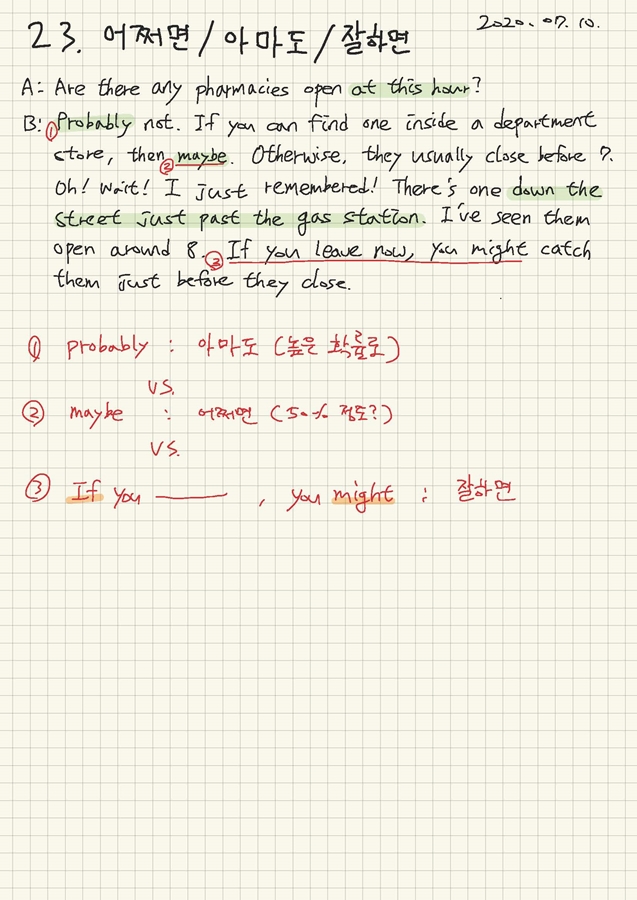 |
|---|
- probably 아마도(높은 확률로)
- maybe 어쩌면(50%?)
- if you ~~, you might ~~: 잘하면~
24. 완전 잊고 있었다.
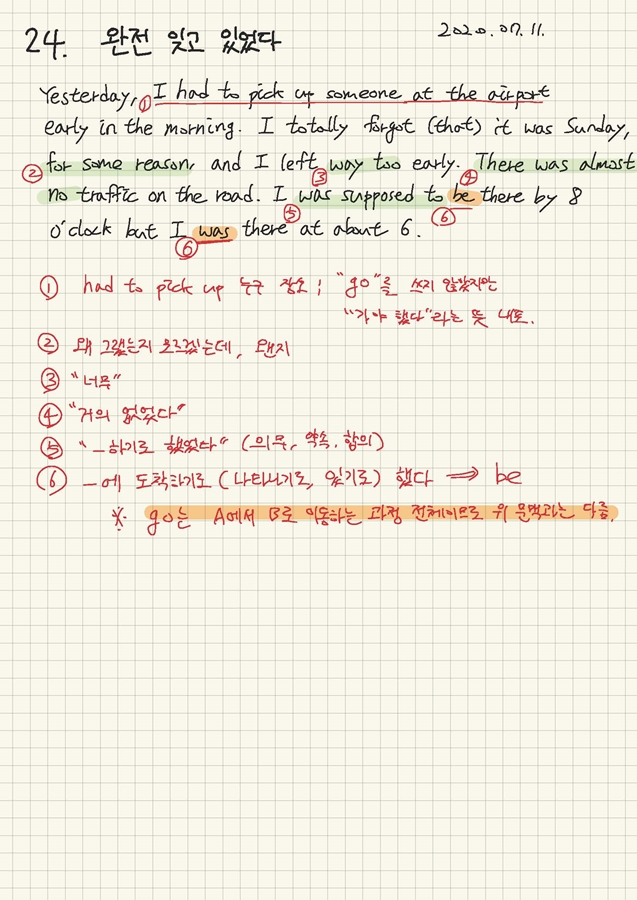 |
|---|
- I totally forgot (that) it was Sunday.
- for some reason 왠지는 모르겠지만
25. 오는 길에 어디 좀 들렀어.
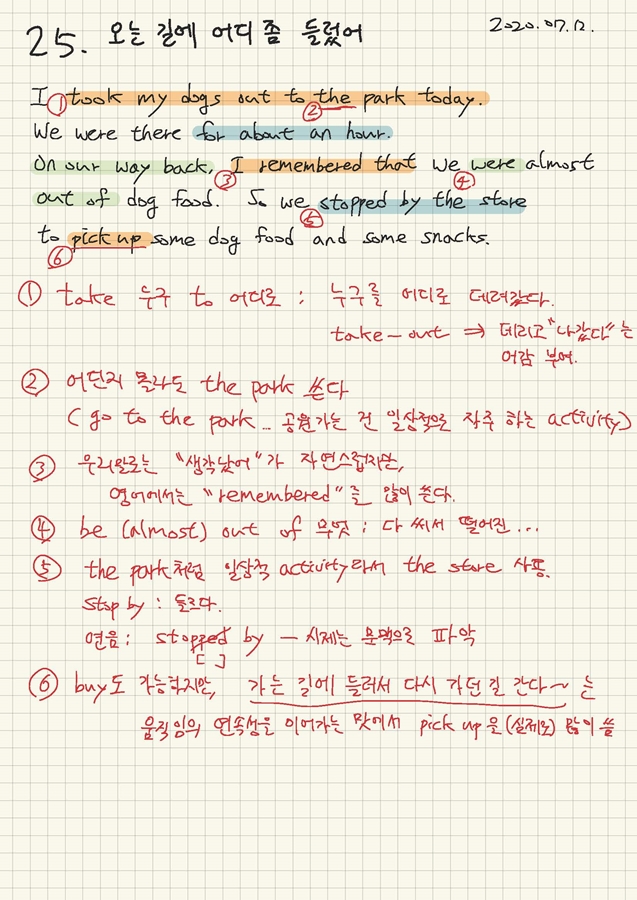 |
|---|
- I took my dogs out to the park today.
- take 누구 to 어디로: 누구를 어디로 데려가다. (out을 써서 데리고 “나갔다"는 어감 부여)
- on my way back: 오는 길에
- we stopped by the store.
26. “잘"을 표현하는 5가지 방식
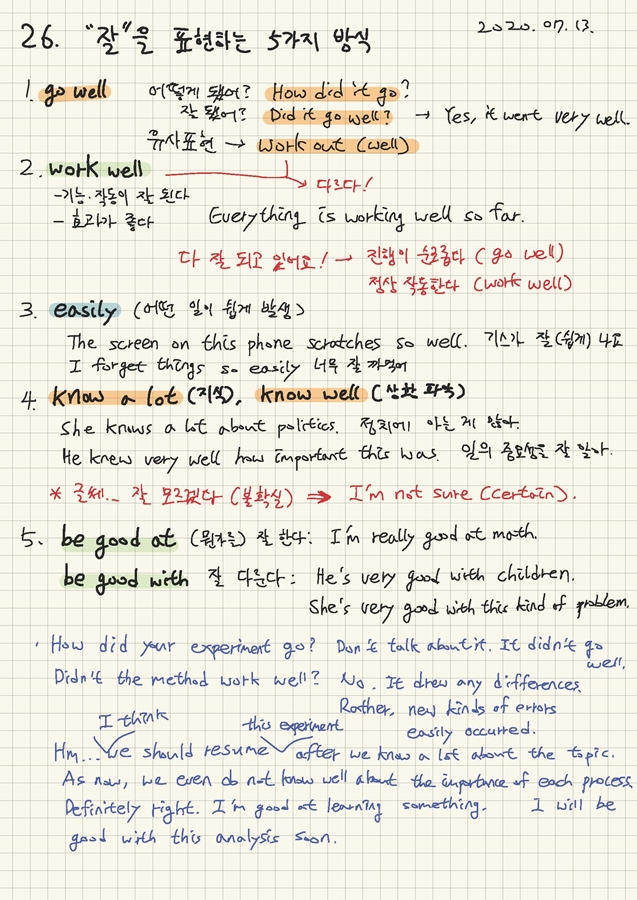 |
|---|
- How did your experiment go?
- New kind of errors easily occurs.
- We know a lot about the topic.
- We know well the context.
- He’s good at Math.
- He’s good with children.
27. 나 왜이러지? 요즘 건망증이 심해. 늙어서 그래.
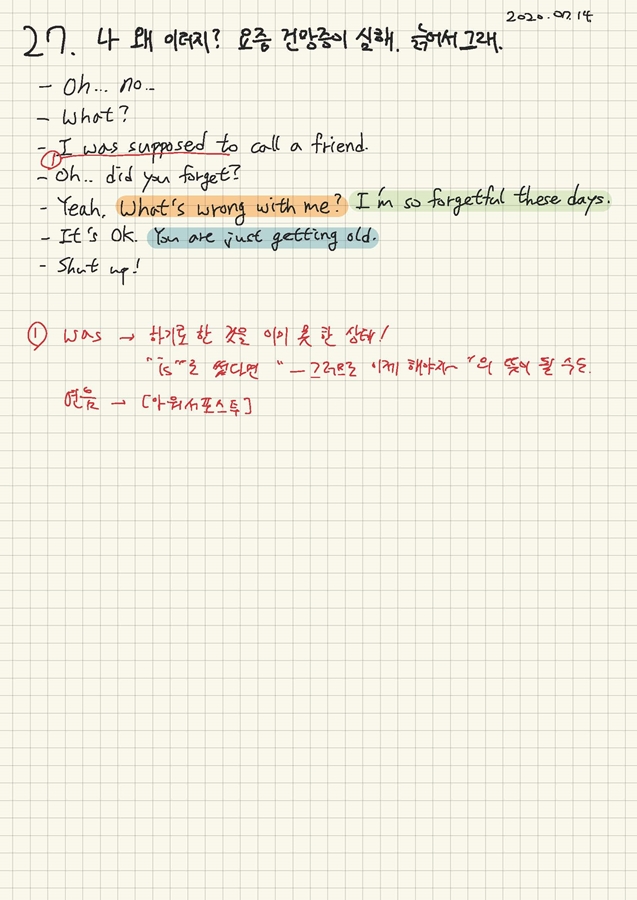 |
|---|
- What’s wrong with me? I’m so forgetful these days.
- You are just getting old.
28. 지금 바쁘면 나중에 다시 올게요.
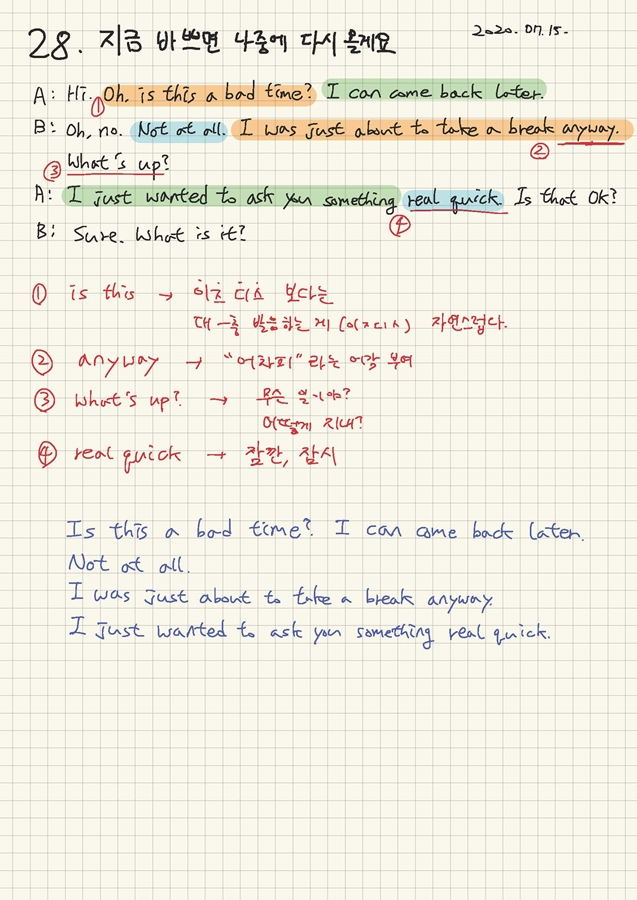 |
|---|
- Oh, is this a bad time? I can come back later.
- I just wanted to ask you something real quick. Is that OK?
29. 아쉽지만 난 이만 일어날게. 벌써?
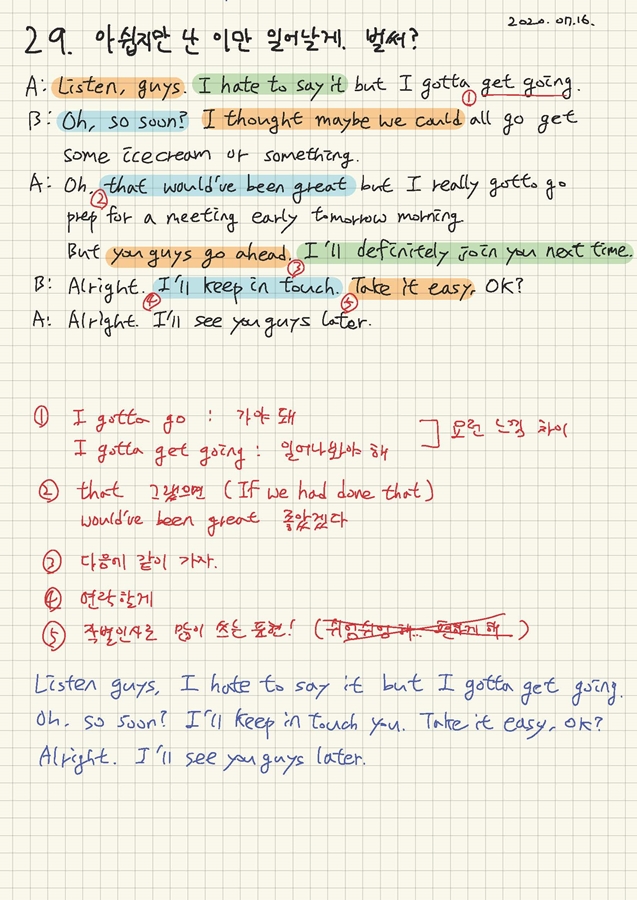 |
|---|
- I hate to say it but I gotta get going.
- Oh, so soon? Take it easy!
30. 오늘 오후부터 하루 종일 비온대. 어쩐지 어둡더라.
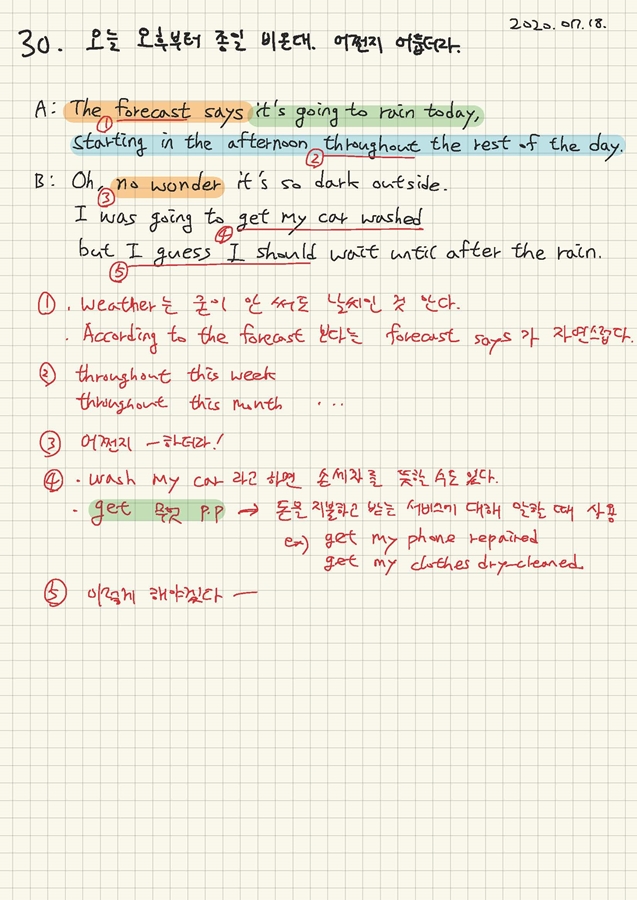 |
|---|
- It’s going to rain today, starting in the afternoon throughout the rest of the day.
- Oh, no wonder it’s so dark outside. (no wonder 어쩐지)
31. 자주 쓰는 영어 속담 4개
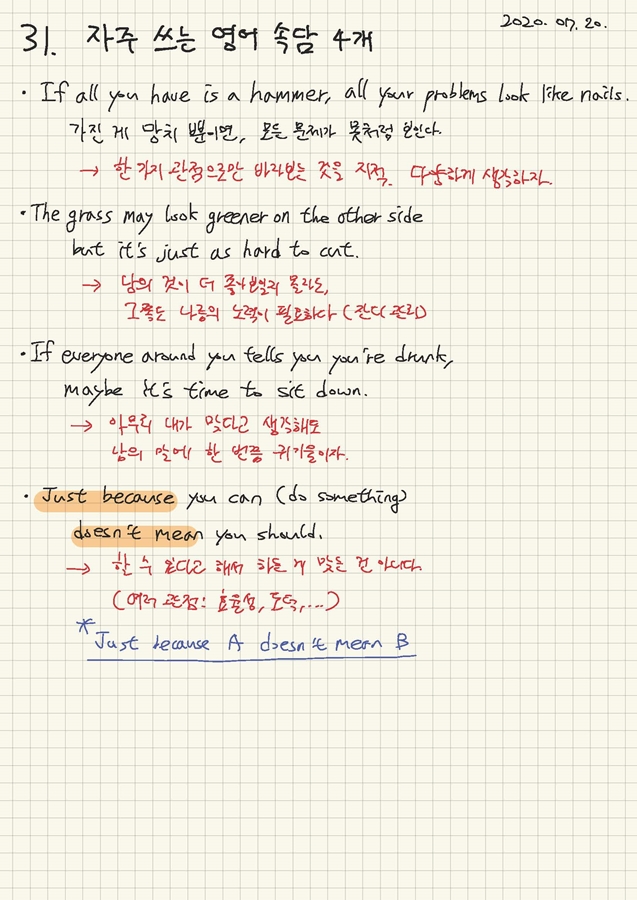 |
|---|
- Just because A doesn’t mean B
32. 늦어서 미안해요. 회사에 일이 생겨서 .. - 괜찮아요.
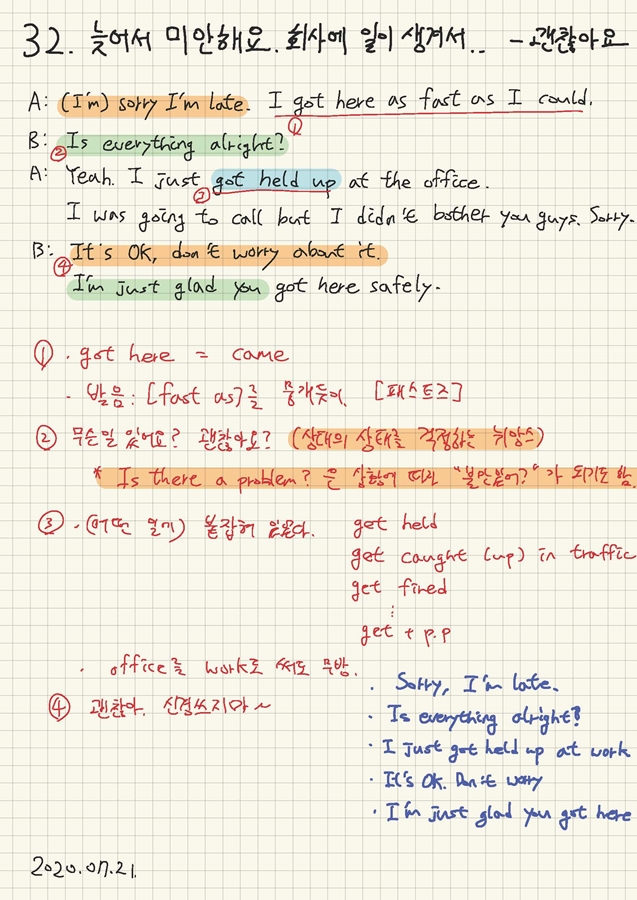 |
|---|
- Sorry, I’m late.
- Is everything alright?
- I just got held up at work.
- It’s OK. Don’t worry. I’m just glod you got here safely.
33. 부족하지만 할 수 있는 만큼 하려고 노력하다.
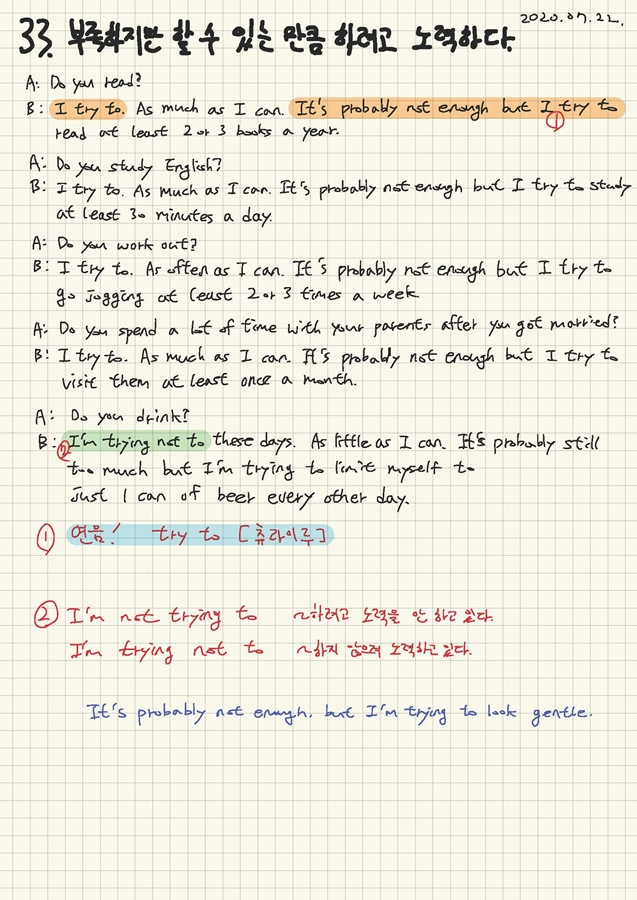 |
|---|
- It’s probably not enough, but I’m trying to look gentle.
34. bring/brings/brought
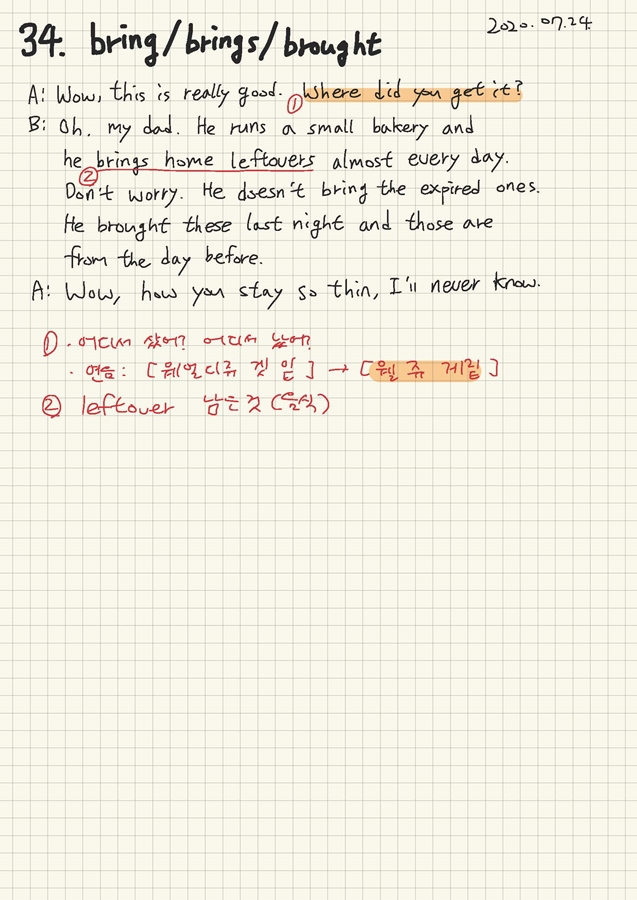 |
|---|
- 연음: Where did you get it? [웰쥬 게맅]?
35. get it checked / fixed / sent
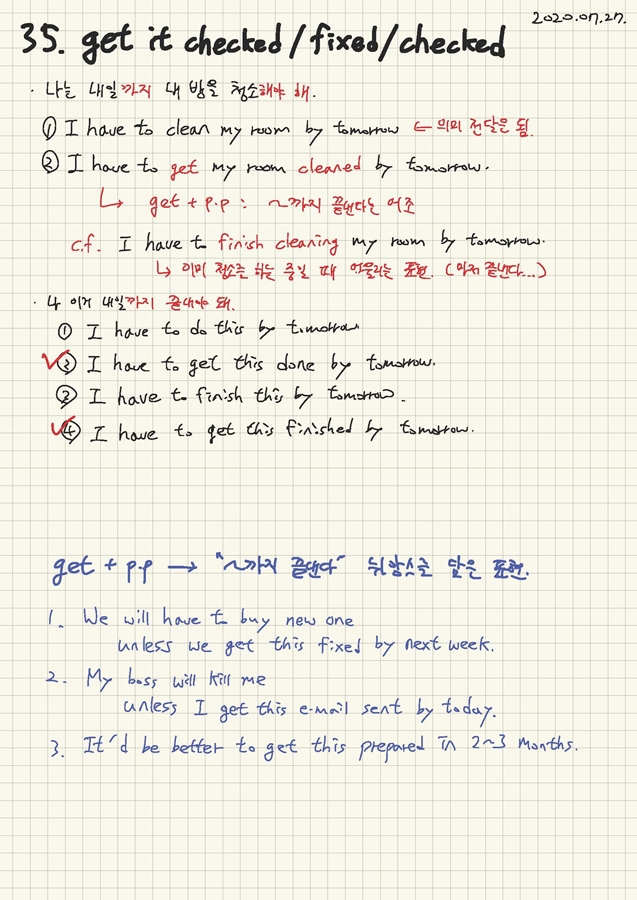 |
|---|
- get + pp = ~까지 끝낸다는 뉘앙스
- We will have to buy new one unless we get this fixed by next week.
- My boss will kill me unless I get this email sent by today.
36. 규칙동사는 발음이 중요하다. 1
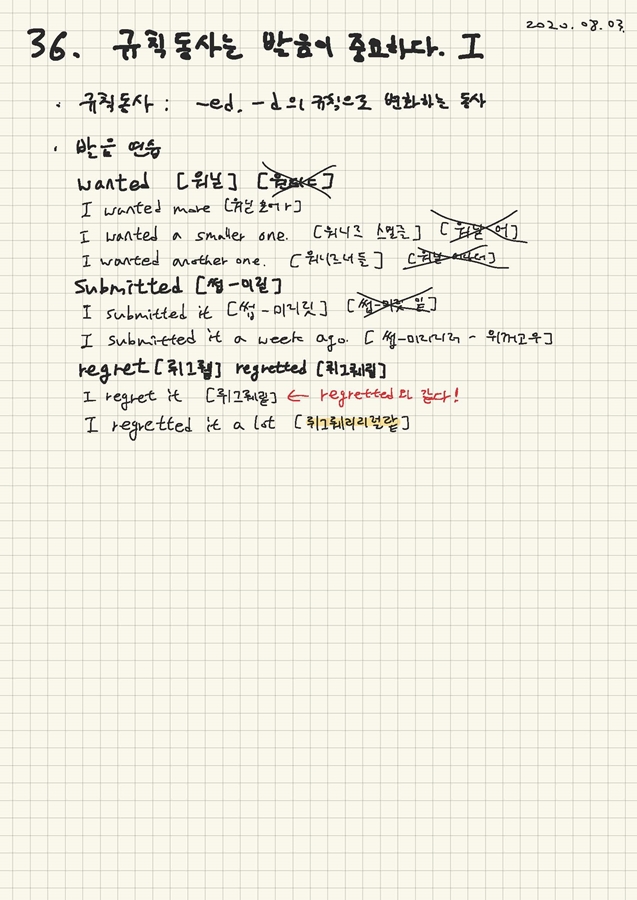 |
|---|
- I wanted another one. [아 워니르너드런]
- I regret it. [뤼그뤠맅]
- I regretted it a lot. [뤼그뤠리리럴랕]
37. 이유와 목적 말하기 part 1
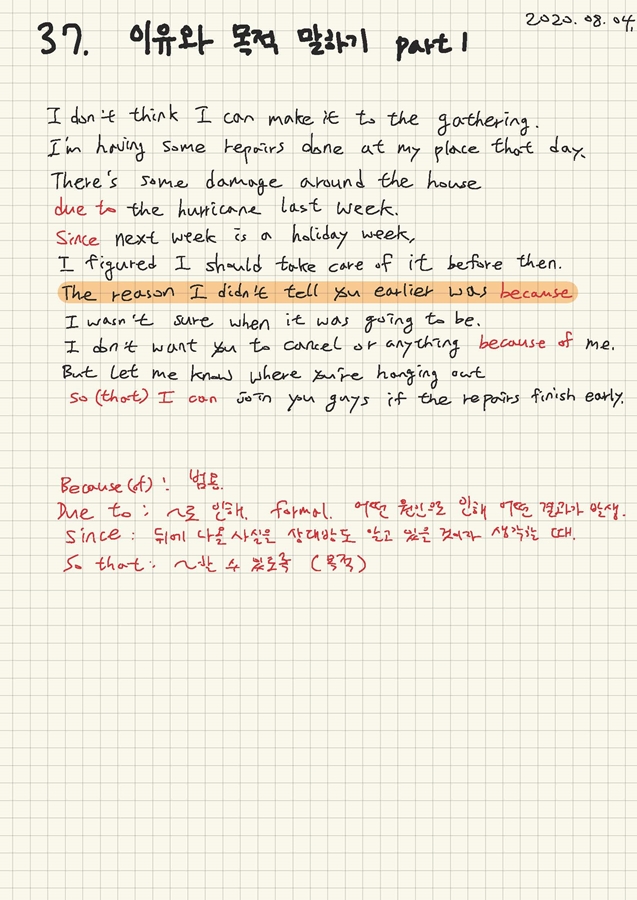 |
|---|
- Because 범용
- due to ~로 인해. formal. 어떤 원인으로 인해 어떤 결과가 발생.
- sicne 뒤에 나올 사실을 상대방도 알고 있을 것이라 생각할 때
- so that ~할 수 있도록 (목적)
38. 이유와 목적 말하기 part 2
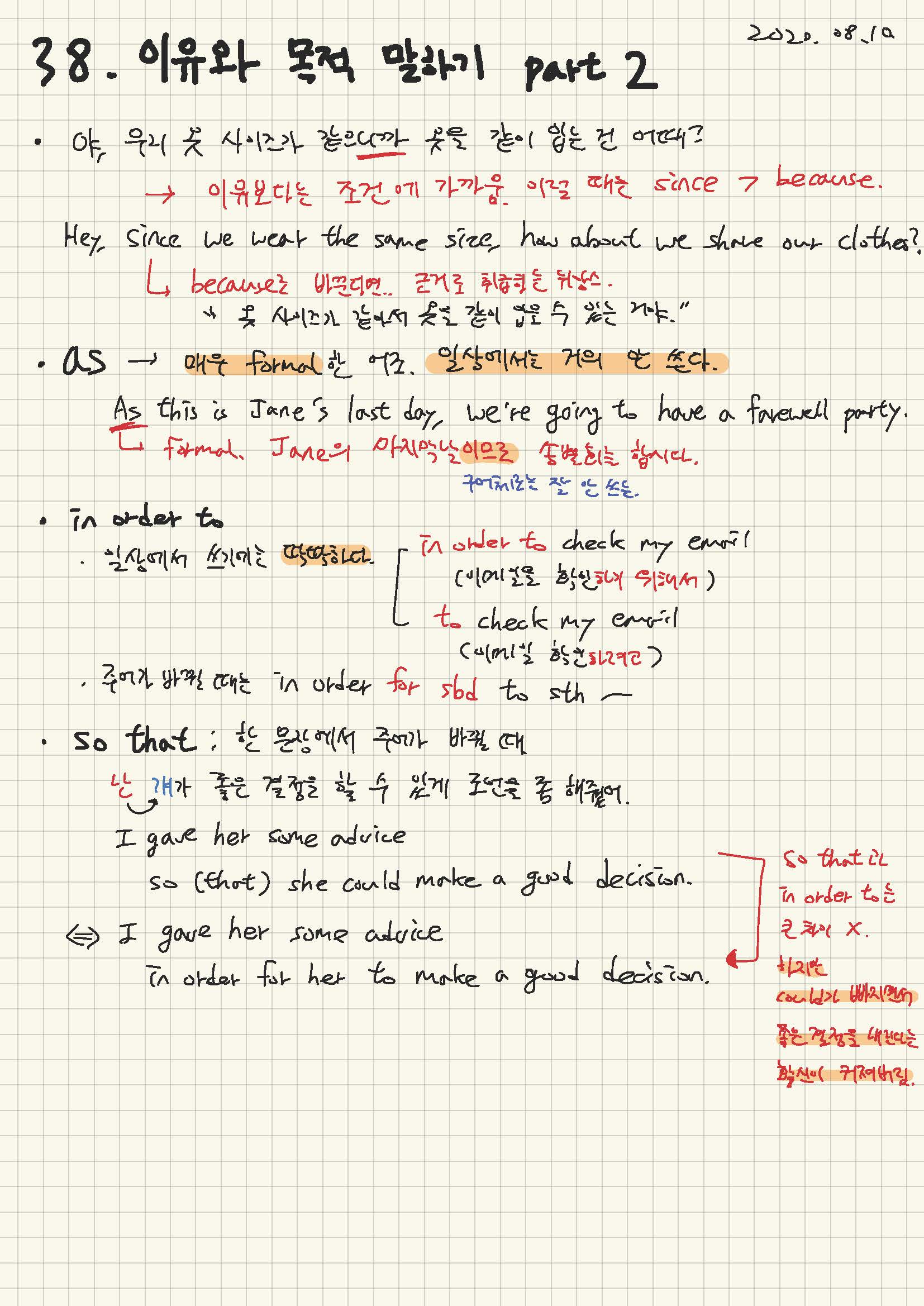 |
|---|
- since는 조건, because는 이유
- since: 야 우리 옷 사이즈가 같으니까 옷을 같이 입는 건 어때?
- because: 옷 사이즈가 같기 때문에 옷을 같이 입을 수 있어.
- as: 매우 formal한 어조. 일상에서 잘 안 씀.
- in order to: 일상에서 쓰기에는 딱딱함.
- so that: 한 문장 안에서 주어가 바뀔 때.
39. 제안이나 초대를 받아들일 때
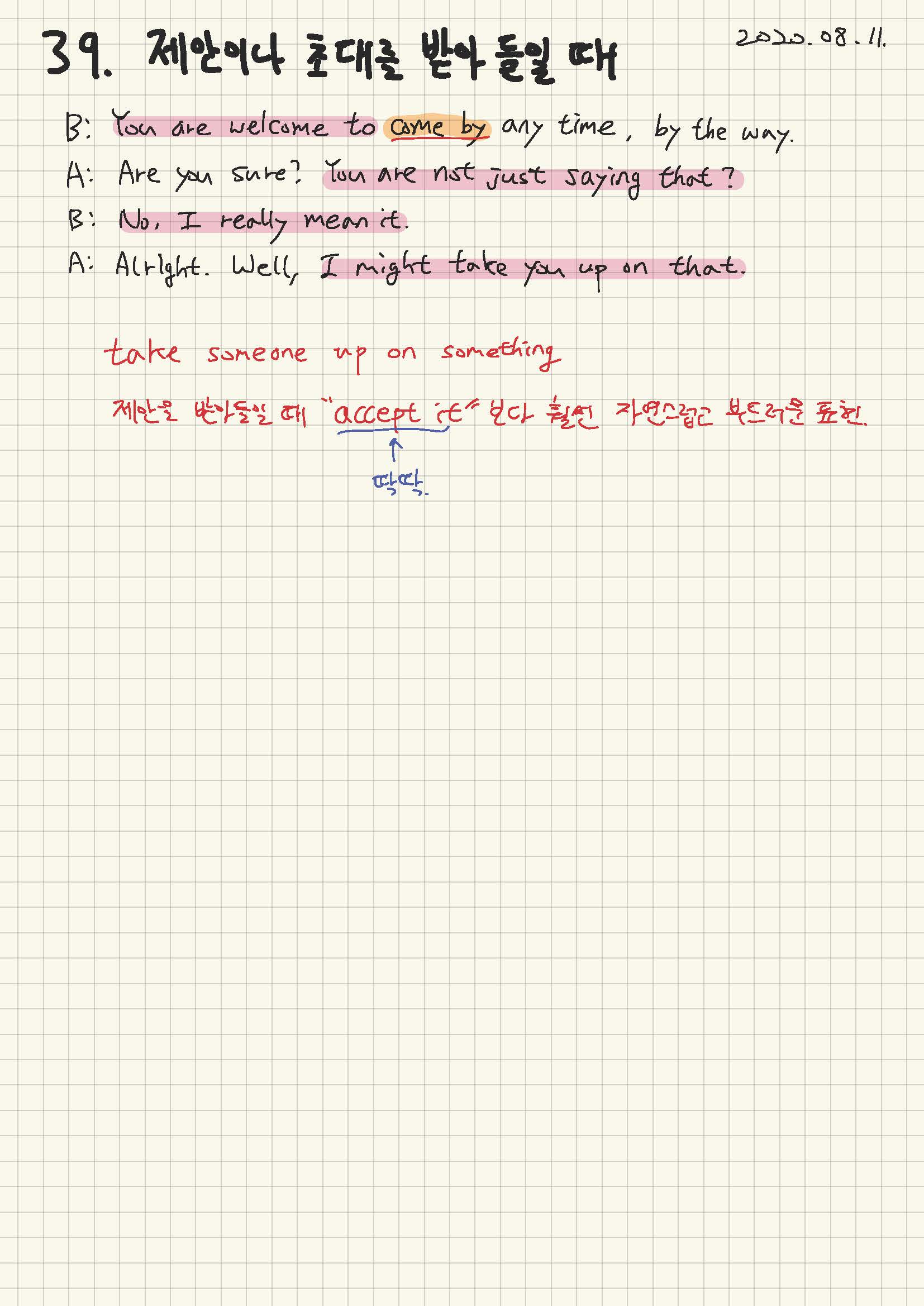 |
|---|
- take someone up on something.
- I take you up on your suggestion.
- I accept it보다 훨씬 자연스럽고 부드러운 표현.
40. let alone / if there’s one thing + it’s
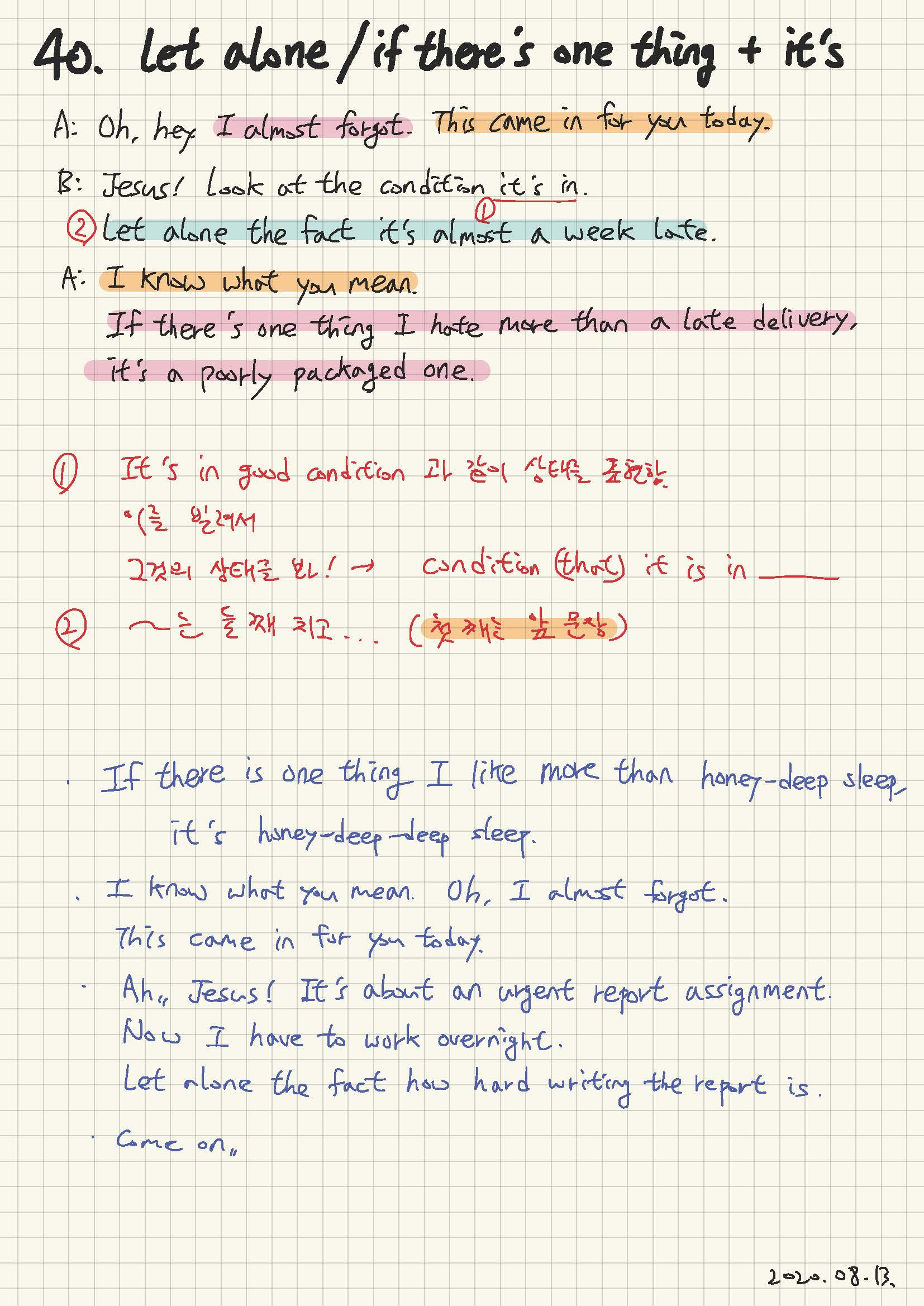 |
|---|
- let alone ~~: ~~는 제쳐주더라도, 차치하더라도
- let alone the fact how hard to do it.
- If there’s one thing ~~, it’s ~~: 강조하는 표현
- If there is one thing I like more than honey-deep sleep, it’s honey-deep-deep sleep.
41. ask의 다양한 활용
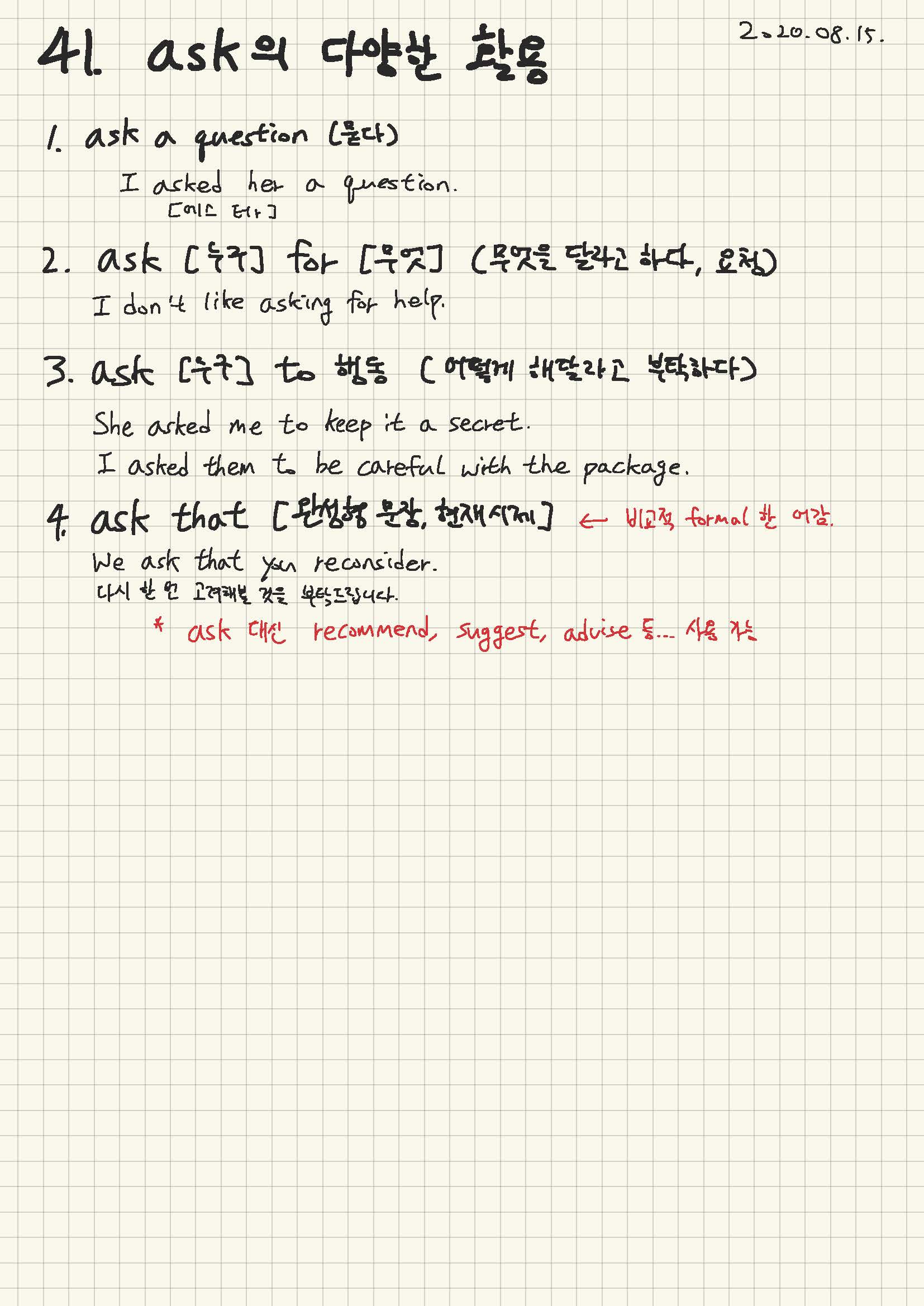 |
|---|
-
ask a question
-
ask 누구 for 무엇
-
ask 누구 to 행동
-
ask that 문장